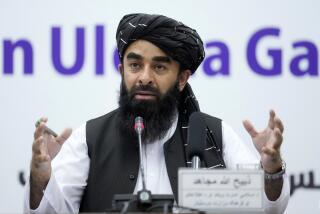Islamic Militia Claims to Hold Key Afghan City
- Share via
KABUL, Afghanistan — Taliban soldiers bombed the last major Afghan city outside their control Saturday and claimed they had captured it, although reports of street fighting made their hold appear shaky.
Residents in Mazar-i-Sharif, 190 miles northwest of Kabul, cowered in basements, listening to a barrage of explosions. The Islamic Republic News Agency in neighboring Iran said bombings were continuous and reported “sporadic acts of resistance in the streets.”
Mazar-i-Sharif would be a big prize in the Taliban’s 4-year-old campaign to impose its interpretation of Islamic rule on all of Afghanistan. The city’s fall would be a severe blow to an opposition already pushed to a dwindling corner of northern Afghanistan.
In the areas it controls, the Taliban has imposed a strict version of Islamic law. Since capturing Kabul, the capital, in 1996, Taliban officials have barred girls from school, confined most women to their homes, forbidden all music except religious songs and banned anything published outside Afghanistan.
Taliban spokesman Abdul Manam Niyazi, speaking by satellite phone from Mazar-i-Sharif, claimed his forces were in complete control of the city.
A spokesman for the key opposition militia in Mazar-i-Sharif confirmed that Taliban fighters were in the city but denied that they had control. The Hezb-i-Wahdat representative, who insisted on anonymity, described fierce street fighting. Another anti-Taliban spokesman claimed later that the Taliban had killed many civilians but had been pushed to a western part of the city.
Fighters were battling late Saturday for control of the airport on the eastern edge of town, Taliban spokesman Abdul Rahof said from the group’s military headquarters in the southern city of Kandahar. He had no details on casualties.
*
The Taliban forces appeared determined not to repeat the mistake they made in May, when they entered Mazar-i-Sharif at the invitation of a warlord who had turned on his anti-Taliban allies. The warlord turned again (allegiance-switching has been a hallmark of Afghanistan’s years of civil war), and the Taliban took heavy casualties while being driven out.
Meanwhile Saturday, Central Asian states and Russia were looking south with increasing alarm as the escalating conflict in Afghanistan raised the specter of attacks, refugees and the spread of conservative Islamic influences.
Russian guards in the former Soviet republic of Tajikistan have begun strengthening the Tajik-Afghan border in reaction to the escalation in fighting in northern Afghanistan, a guard spokesman said.
Efforts were being concentrated on two divisions patrolling the borders about 125 miles south of the capital, Dushanbe, where Taliban forces were most likely to attack, the spokesman said.
He did not specify what measures were being taken to strengthen Tajikistan’s southern flank.
The Taliban, which means “students of Islam,” emerged in 1994, pledging to bring peace to an Afghanistan devastated by years of civil war.
In 1979, the Soviet army invaded and occupied Afghanistan for 10 years, until it was driven out by U.S.-backed Afghan guerrillas and internecine battles resumed. More than 1.5 million Afghans have died in the power struggles since the 1980s.
More to Read
Sign up for Essential California
The most important California stories and recommendations in your inbox every morning.
You may occasionally receive promotional content from the Los Angeles Times.













